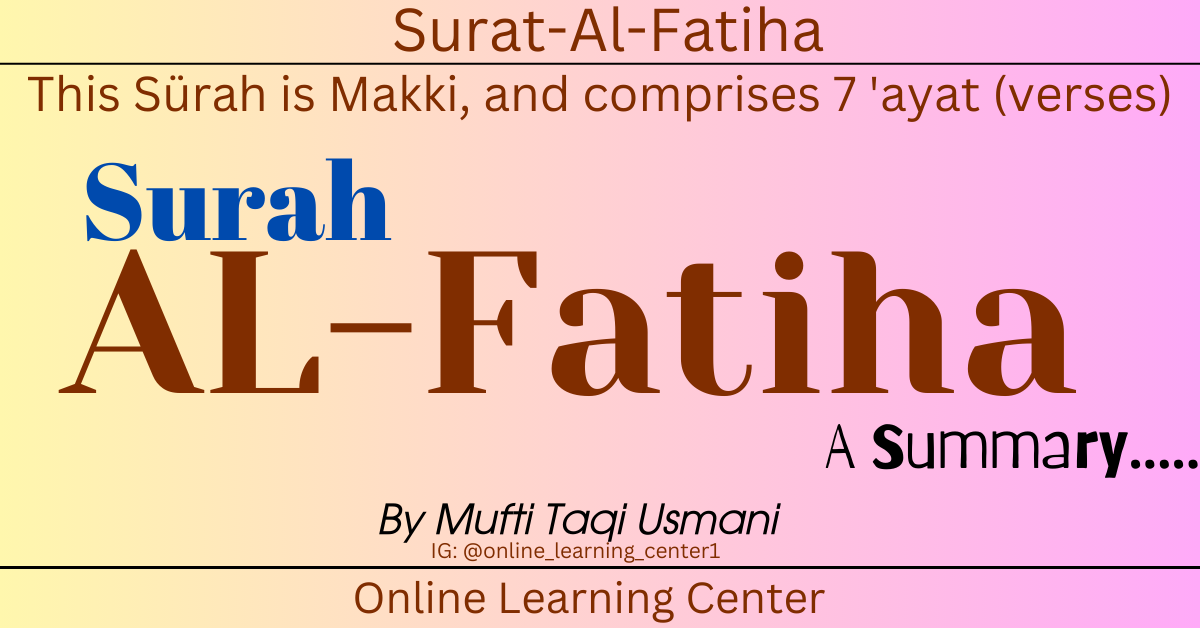Surat-Al-Fatiha
This Sürah is Makki, and comprises 7 ‘ayat (verses)
This is the first Sürah of the Holy Qur’an, not only in its present order, but also in its order of revelation in the sense that no other Sürah had been revealed completely before this. Some verses of other Sürahs, like those of Sürah 96 and Sürah 74 etc. were revealed earlier than this, but it was the first complete Sürah that was revealed to the Holy Prophet SAW in Makkah. It has been placed before every other Sürah in its present compilation, because it is, so to say, the quintessence of the Holy Qur’an; the rest of the Qur’an is its elaboration. That is why it is named Al-Fatihah (The Opening). The theme is that, in order to benefit from the Holy Qur’an, one must admit the basic attributes of his Creator, seek guidance from Him, and recite and study it with open mind and heart like a true secker of Truth. This Sürah is an instruction from Allah Ta’ala how one should request and pray to Him for seeking guidance. The entire Qur’an following this Sūrah is an answer to this request.

With the name of Allah, the All-Merciful, the Very-Merciful. Praise belongs to Allah, the Lord of all the worlds3 [1], the All-Merciful, the Very Merciful.4 [2] the Master of the Day of Requital. [3] You alone do we worship, and from You alone do we seek help. [4] Take us on the straight paths [5] the path of those on whom You have bestowed Your Grace, [6] not of those who have incurred Your wrath, nor of those who have gone astray, [7]
1) Sürah is the special name given by the Holy Qur’an itself to its chapters. The chapters revealed before the migration of the Holy Prophet SAW from Makkah are called Makki, and those revealed after His SAW migration to Madinah (Medina) are called Madani.
2) It means that whosoever praises anything anywhere in the universe is ultimately praising Allah, because He is the Creator of everything, and admiration of any object is, in fact, admiration of its producer.
3) The original word in Arabic is ‘Alamin – the plural of Alam, and it includes every possible form of existence: the sky, the earth, the sun, the moon, stars, wind, rain, the angels, the Jinns, animals, plants, minerals, and, of course, men. In the absence of an accurate word in English, it is translated as ‘worlds’.
4) This is the translation of the Arabic words: Ar-Rahman and Ar-Rahim. Both are attributes of Allah Ta’ala, denoting His extreme mercy. The difference between the two is that Rahman indicates the extensive nature of His mercy, hence it is translated as ‘All-Merciful’, while Rahim refers to its intensive quality, and therefore it is rendered as Very-Merciful’
5) ‘Guidance’ may be given to someone in two ways. One is that he is verbally directed towards the right path, or it is shown to him from a distance, then it will depend on him whether or not he adopts the correct direction. The second way of guiding someone is that he is physically taken to the right path. According to the Arabic usage, it is the second type of guidance that is intended here, because in the first case, the expression would have been: Ihdina-ilas-sirat- il-mustaqim. Hence the translation: “Take us on the straight path’.








